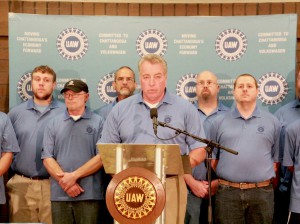
Gary Casteel, the UAW's Secretary Treasurer and leader of the union's organizing effort in Chattanooga, is meeting with VW to discuss the future of the plant.
Volkswagen AG is preparing to open discussions with United Auto Workers on the sensitive issue of whether it will accept the presence of the UAW at its plant in Chattanooga.
The pair have said that they will now meet to try to resolve their differences, reopening a process that could lead to talks over union representation of the workforce at the German car maker’s Chattanooga, Tennessee, plant.
If the VW accepts the UAW as a bargaining agent for maintenance workers at the Chattanooga plant, it would mark the first time the a European or Asian automaker with a plant in the Southeastern U.S. has agreed to bargain with the UAW.
Last month, Volkswagen said it planned to challenge a decision by the National Labor Relations Board that upheld a vote in favor of the UAW by the plant’s skilled trades, who maintain machines and robots. Two years ago, the factory’s broader population of hourly workers narrowly rejected union representation after a contentious campaign highlighted by fierce opposition to the union by conservative politicians in Tennessee.
(Bending the truth? Automakers under fire. For more, Click Here.)
The labor dispute in Chattanooga, however, opens another battle front for Volkswagen in the U.S., as the carmaker struggles to resolve its emissions-cheating scandal, rebuild its tattered reputation and prepares to start production in Chattanooga of a new midsize sport-utility vehicle later this year.
However, the company chose instead to reach out to the UAW, it could trigger a backlash among conservative lawmakers in Tennessee, who have threatened to withhold incentives for the Chattanooga plant if Volkswagen recognizes the union.
As it stands Karlheinz Blessing, a Volkswagen board member in charge of human resources, and Gary Casteel, the UAW treasury secretary, will meet later this month, initially to try to resolve a dispute over representation the plant’s maintenance workers, the two sides said. The company has declined to recognize those workers as a bargaining unit, saying it doesn’t want the UAW to fragment its workforce.
“We have made an offer to talk,” Blessing told reporters in Germany as he basically re-iterated the company position that it wants one union representing the entire workforce. “We can accept a vote of the entire workforce, but we cannot accept fragmentation.”
The UAW is wary of holding another vote among the plant’s production workers. Volkswagen encouraged the union to hold the 2014 vote even as company executives made clandestine agreements with Tennessee officials to keep the union out of the plant, or risk losing millions of dollars in state incentives, union officials have noted.
(Click Here for details VW appealing the recent NLRB ruling.)
Volkswagen said it maintained strict neutrality during the union’s organizing campaign.
Casteel, the UAW board member who has dealt with Volkswagen, said that after the 2014 vote, Volkswagen pledged to recognize the union if it could prove that a majority of the workforce were members. As part of that agreement, the UAW dropped its legal objection to the outcome of the election.
In the spring of 2014, the UAW met with members of Volkswagen’s management and human resources and compared names on UAW membership cards with the employee list at the Chattanooga plant, determining that at least 55% of the employees were members of the union.
“They committed to recognize us as the representative of their workers,” Casteel said in an interview. “We want to move forward, not backward. We want them to live up to the commitments they made.”
Maintenance workers at the Chattanooga plant voted by a 71% majority in December to create a collective bargaining unit, paving the way for them to negotiate for wages, benefits and work rules. The vote also opens the door for wider union representation at the plant.
The NLRB recognized the vote, and then dismissed Volkswagen’s request for a formal review of the decision.
(VW to spend $8.8 bil to repair or buy back rigged U.S. diesel vehicles. Click Here for the latest.)
Casteel said Volkswagen is in violation of U.S. labor law in refusing to recognize the maintenance workers as a collective-bargaining unit.
